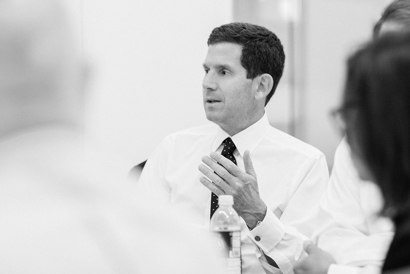David Perla is a Managing Director at Burford Capital, overseeing global marketing and business development operations.
As the former president of Bloomberg Law and co-founder of Pangea3—a global legal process and outsourcing provider that was eventually acquired by Thomson Reuters—you had a birds-eye view of the legal industry. What was the most important thing you learned?
I think the most important takeaway is that law is not monolithic. We tend to bifurcate law into large law and small law, or into law firms and in-house counsel. Even those distinctions are misleading. Law is much more nuanced and layered than that. Within just one segment—whether you’re in a large law firm, government, academia, etc.—there are massive differences among various entities and firms, and even within firms.
It's unhelpful to think of the space in which we work as broadly as “law” or “the legal industry.” We use that shorthand—and I'm guilty of it when I write—but law is incredibly individualistic. Every firm and legal department has its own culture, pacing and way of doing things on top of all the nuances among employees, so it’s really important to try not to generalize the business.
You joined the Burford team this past spring. What about Burford has surprised you the most?
For a public company, Burford is very unbureaucratic and truly empowers its people to a degree that—on its own—surprised me. I’ve also been surprised by the company’s infrastructure. Even coming from Pangea3 and Thomson Reuters, this is among the best infrastructure that I’ve ever seen in terms of how Burford has built out departments, the way its leaders think about technology and the focus on scalable systems. These are things that even mature businesses struggle with, but Burford has really mastered them without becoming bureaucratic. It’s as if Burford anticipated its own success and then built those tools in advance.
You’ve worked at a range of innovative companies. How has Burford proved to be like (or unlike) your previous companies?
In one respect, Burford is similar—particularly to a place like Bloomberg Law—in that our founders still actively lead the business, which is unique at very large, successful companies that are well-known in their space. Working for a firm where the creators are still present means that people take the business personally, which is very important. It brings a passion that you don't see in companies run by exclusively professional leadership. Here, everything is what's best for our firm’s relationships, what’s best for our counterparties and what’s best for business.
What’s the one thing you wish lawyers knew about legal finance?
The one thing I know wish lawyers knew about legal finance is finance. Lawyers need to understand math. They need to understand Excel. They need to understand the economics of the business they're in.
One way that Burford works to counterbalance this is by hiring lawyers who themselves overcame their disinclination towards economics, because they are then able to educate our clients. But I don’t think we can just go out and educate everyone. It’s on us to describe our business and our solutions in a lexicon that legal professionals can more easily understand.
If you could go back to school now, what would you study? Why?
I was an English major with a concentration in Drama and Dramatic Writing—laughs—leading, naturally, into a career in legal outsourcing and legal finance. But if I were to go back to school, I think I would have studied political science and economics because those are the things that I gravitate towards now. In my spare time I'm not reading great works of fiction; I'm reading much more history and political thought and theory. That said, if I had studied politics and economics, I'm sure I’d be sitting here telling you I wish I’d been an English major.
Top five… podcasts to listen to on a long commute?
- Presidential
- Constitutional
- Tivkah
- The New Yorker Radio Hour
- Revisionist History




